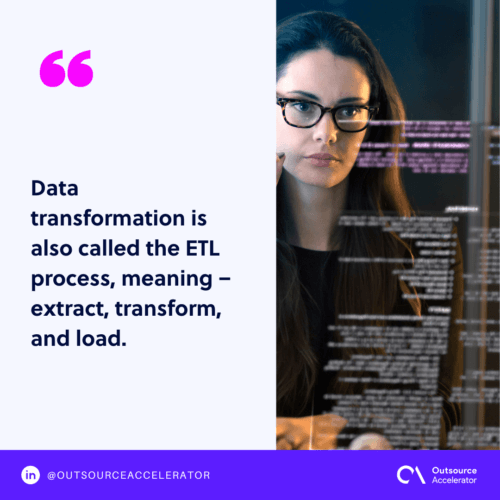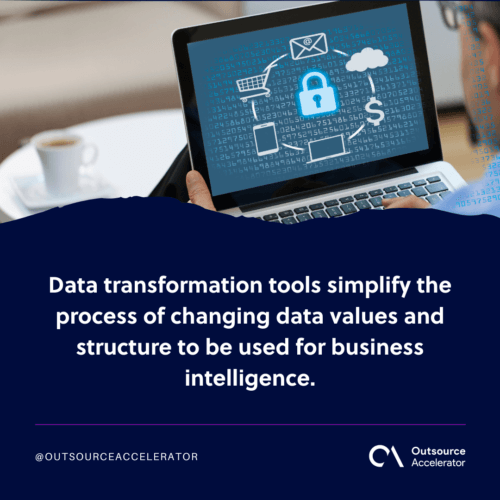10 Best data transformation tools for 2025

10 Best data transformation tools
Businesses possess vast amounts of data. This raw data flow is useless without efficiently processing and analyzing it. Because there’s such a great amount of information, there’s also a great risk[1].
Businesses must have the right systems and solutions to get the most out of their data assets; this is where data transformation plays its role.
What is data transformation?
Data transformation converts data into a format to aid business decisions and identify growth opportunities.[2]
The data transformation process is called the ETL process, meaning – extract, transform, and load. It organizes raw data for better indexing in data warehouses.
The resulting modernized data infrastructure also aids in detecting and responding to cyber threats and preventing costly breaches.
The process is typically performed by developers, data analysts, and data scientists, using software tools to transform the data.
Benefits of data transformation
Here are a few benefits that organizations receive from data transformation:
Improved data quality – Data transformation ensures accurate and consistent data by converting data from one format to another, cleansing, and validating it. This enables organizations to have high-quality data for analysis and decision-making.
Efficient data integration – Data transformation facilitates data integration by converting data from different sources into a unified and coherent format, reducing the risk of data silos and promoting data consistency across the organization.
Enhanced data analytics and reporting – Data transformation enables organizations to efficiently extract, aggregate, and manipulate data into a structured and usable format. This simplifies complex analysis tasks, generates insights, and supports informed decision-making.

What are data transformation tools?
Dedicated data transformation tools are required to seamlessly move data between different storage bases and computer systems so that data transformation can occur. A growing number of businesses today are using the cloud for this purpose.
Data scientists operate on the GIGO principle, meaning garbage in and out. Applied to their work, this means that if the input data is “garbage,” the resulting output data will also be nonsense and useless.
Data transformation tools simplify the process of changing data values and structure to be used for business intelligence.[3] Automation improves efficiency, and these tools can quickly transform large amounts of data, often within minutes.
Data transformation tools extract data from various sources and formats, processing and refining it to load into data warehouses.
This can also be called the ETL pipeline, a kind of data pipeline. Data pipeline, as a term, broadly refers to moving data between systems.

The best data transformation tools
There are a lot of tools out there that have been developed for this kind of software manipulation. The best data transformation tool will depend on your situation and needs.
We’ve compiled 10 of the most widely recommended tools below:
1. dbt
Data build tool (dbt) is one of the most straightforward command tools on the market when it comes to data transformation. This tool is especially useful if you’re looking to create tables and views with incremental strategies.
dbt was developed by dbt Labs and had been growing in popularity in recent years. The tool is an open-source, command-line solution that you can use to rapidly transform data using only SQL coding.
However, it truly shines when you leverage the dbt IDE, an integral component that provides an interactive development environment specifically for data modeling that is SQL-based.
The tool helps you transform, test, and document data from different sources, including cloud warehouses, data lakes, and lake houses. It presents an interactive development environment specifically for data modeling that is SQL-based.
Software best practices are followed in this data transformation tool. These include modularity, portability, Continuous Integration and Continuous Delivery (CI/CD), and documentation. This has the effect of making the tool very scalable.
dbt lets you produce trusted data sets to support ML modeling, operational workflows, and reporting.
Transparency is also a big feature, and the tool offers in-app scheduling, logging, and alerting. These only concern the transformations you run, as dbt doesn’t store or reveal data from the warehouse, so your data ownership remains yours.
However, the platform requires its users to possess advanced SQL expertise and Python skills. It’s otherwise inaccessible for anyone who isn’t trained in those IT skills. If your team has the knowledge, it’s worth pursuing.
2. Matillion
Matillion was developed in early 2011 in Manchester, UK with the goal of bringing business analytics as a service. In the decade since, they’ve grown to a size of 500+ employees and are valued at about $1.5 billion.
The company offers two products for data transformation: Matillion ETL, and Matillion Data Leader. These tools help you migrate and load your data into your chosen cloud data warehouse, whether it’s an API, application, database, plain file, or NoSQL database.
The tools have a friendly and intuitive user interface, making for a relatively easy user learning curve. The simple drag-and-drop interface allows anyone to create complex transformations.
With Matillion, you can automate and schedule pipeline-related jobs as well as automatically generate documentation. Another feature is its reverse ETL function, so you can write your transformed data back into the warehouse for storage.
The tools come with pre-built connectors that integrate with many industry-recognized data warehouse solutions.
In addition, you also have the option to download free connectors or create custom ones for different applications.
3. Informatica
Informatica offers an intelligent data management cloud tool which transforms data on the cloud or hybrid infrastructures.
Data formats can be mapped using pre-built transformations on this data transformation tool platform. No code is necessary.
The tool also integrates well with traditional databases and other applications to convert diverse data sources in real-time. This includes integration with other Informatica data management products, like its data catalog, and its other tool PowerCenter.
Informatica PowerCenter is an enterprise data integration platform for ETL workloads. This tool ,in particular, comes with a very high reputation for performance and compatibility with many data sources, including SQL and NoSQL databases.
Despite its high expense and a somewhat challenging learning curve, the data transformation tool has a loyal following. It was named a G2 Leader in the field of data integration software.
4. Talend
Talend’s data integration platform gathers data from different sources to organize them into a more structured manner for use in business intelligence. The tool also provides scalability solutions for large volumes of data.
Talend’s tool integrates the variously-sourced data into an on-premises or cloud-based data warehouse for secure analysis. The self-service user interface will also be accessible to many developers.
The free, open-source version is already enough for many users, but larger businesses may also opt to try their data management platform, which includes additional tools and features for design, productivity, management, monitoring, and data governance.
5. Trifacta
Trifacta was founded as a privately-owned San Francisco software company in 2012. Mainly developing data wrangling and manipulation software, they’ve since been acquired by the larger software company Alteryx.
They aim for their data transformation tool to become an open, interactive, self-service but enterprise-grade tool that will help with all your data wrangling needs. As it is, Trifacta provides a visual representation platform that helps data engineers manipulate their data.
Currently, all major cloud providers support the tool, including Google Cloud Platform, Amazon Web Services, and Microsoft Azure. On-premises deployment is also allowed so that you may enable your data pipelines based on the provider of your choice.
Thinning ahead, the tool offers unlimited scalability so that performance remains optimal. Built-in governance is also included to ensure pipelines are high quality and well-tested.
This is among the data transformation tools designed for data engineers and analysts. But less tech-savvy users can also be guided by machine learning through its friendly interface.
6. Datameer
Datameer is a SaaS data transformation tool designed for the major data cloud company Snowflake. It covers your entire data life cycle journey, from discovery, transformation, deployment, and documentation, all within the Snowflake cloud.
Within Snowflake, data analysts and engineers are empowered to transform data directly, either without code or with a simple SQL equation. Even when handling large data sets, the operation is fast and responsive.
One of its best and more unique features is its search function, allowing Google-like scans of its database. The platform also provides data lineage, audit trails, and full management for metadata like tags, descriptions, and properties.
Datameer is perfect for both technical teams and users with little IT experience. The platform essentially democratizes data management, so anyone in the organization can participate in data transformation, cataloging, and governance.
Team members can choose how they engage with the data and can collaborate from a single location. Even non-technical people can navigate through the interface and easily transform data.
7. Dataform
Dataform deploys your SQL definitions directly to Google BigQuery as soon as your data workflows are built, even making tables and views while tests are being run. Transformations are fast and efficient in this data transformation tool.
The tool lets you instantly bring together hundreds of data models, turning SQL queries into powerful data sets. You can build robust data pipelines and reliable data sets, and even work collaboratively on SQL pipelines.
The Dataform platform has a good documentation feature for data sets. Through JavaScript, you can enable script and code reuse to avoid repetition.
Version control allows you to inspect all changes before transforming. After tests are run, you can trust that the result is a documented and well-tested data set visualized on your reporting dashboards.
8. Whatagraph
Whatagraph is originally a reporting tool used by marketing agencies and in-house marketers to create engaging reports. However, as of 2024, Whatagraph also offers a data transformation feature that makes it the ideal choice for anyone dealing with large data volumes.
With Whatagraph, you can move your data from a variety of marketing sources to BigQuery in a normalized state. All you need to do is connect your data sources (LinkedIn Ads, Facebook Ads, Google Analytics 4 and many others) and move it to BigQuery through Whatagraph, with one click.
There are a few benefits to using this tool. First of all, the data will be moved to BigQuery in a fully normalized state, meaning it’s ready to use immediately. Second of all, Whatagraph now allows you to take this data and visualize it in their reporting tool.
This makes it the best choice for marketers who have lots of data and need to visualize it in beautiful reports.
9. Pentaho
Formerly known as Kettle, this tool is an open source platform from the Hitachi Vintara company that’s used for data integration and analytics. The platform specializes in integrating and analyzing enterprise data.
Pentaho has a user-friendly interface to build robust data pipelines, connecting various data sources and moving data of any size or format.
Operating on both hybrid and cloud-based infrastructure, minimal coding skill is needed to use this tool. The enterprise version has added features, like a larger library of connectors and technical support.
10. Hevo Data
Hevo Data supports over a hundred integrations for databases, cloud-based applications, and streaming services. Within minutes you can set up data transformation pipelines with no coding required.
Its efficiency allows for easy scaling of pipelines. Pipelines themselves are easily set up because Hevo Data will automatically build the data flow. Just choose your data source, add your credentials, and choose the destination warehouse for loading.
Users can use Python to define their pre-load transformations, and there is even the option of reverse ETL to send warehouse data to any business application.
Hevo Data supports the most popular data warehouse destinations, including Redshift, BigQuery, and Snowflake.







 Independent
Independent




